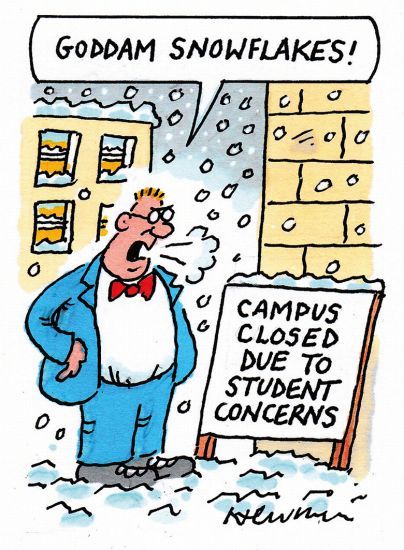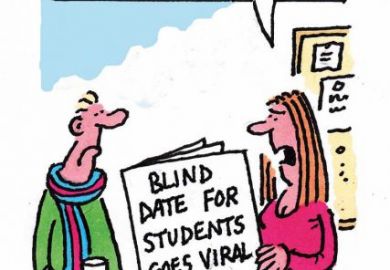
The lightest dusting of snow is sometimes enough to force the closure of schools and colleges, parents often complain. That suspicion that winter weather is a convenient excuse for a day off for teachers has surely, however, been put to rest by the University of Michigan-Ann Arbor, which attempted to remain open despite wind chill temperatures reaching as low as -35C. Not all students, however, were impressed, with a petition stating that students were “deeply disturbed” by the refusal to close after a campus bus full of passengers spun out and crashed into a tree, the Chronicle of Higher Education reported. “Not cancelling classes is a careless move,” the petition said, adding that “it spells ignorance on the administration’s part to the plight of many of its marginalised community members”. The students eventually prevailed, with the university cancelling classes for only the third time in 40 years.
There were more headlines over no platforming of controversial speakers at UK universities after the government released guidance to protect free speech on 2 February. The rules were drawn up by the Equality and Human Rights Commission after ex-universities minister Sam Gyimah brought together 10 organisations, including the National Union of Students and the Home Office, last year to discuss the issue. While the advice that speakers deemed by some to hold transphobic views should not be disinvited by students’ unions will be welcomed, those hoping for an end to “safe spaces” will be disappointed. This practice is “not unlawful”, according to the guidance, and “in some cases the latter can help to promote free speech,” The Guardian reported. On whether controversial right-wing or anti-abortion groups could be excluded legally from freshers’ fairs, there was even less clarity for students’ unions, suggesting that the complex legal questions around these scenarios will continue to vex universities for some time.
You’ve been warned about fake news, but did you hear the one about the fake university? The spuriously named “University of Farmington”, supposedly based in Michigan in the US, was set up by undercover agents in 2015 in a direct attempt to catch foreign nationals hoping to stay on beyond their student visas. Now, the Indian government is attempting to sue the US, the BBC reported, after 130 students – including 129 from India – were arrested and charged with immigration offences. If convicted, the students face possible deportation, but Indian officials claim that the students could have been tricked into applying. It’s not the first example of a fake university in the US – immigration agents set up the “University of Northern New Jersey” in 2016 under similar pretences. Ultimately, the ruse could well achieve what it set out to, by putting even more students off US study.
In news that will not surprise anyone, a study by the University of Surrey revealed that women who wear skirts and dresses in an academic setting are perceived as less intelligent than those who wear trousers. For the study, published in Frontiers in Psychology, researchers showed participants photographs of women at a graduation ceremony and asked them to guess their final marks. The example outfits were split into “sexy” – skirts and dresses – and “professional” – jackets and trousers (problematic to say the least). Sure enough, those wearing “sexy” clothes were thought to have a lower final mark and thesis points than women wearing what was deemed more “professional” attire. Odder still was the finding that adult participants in the study judged the students in “sexy” clothes as having a higher rate of success in finding a job. We can’t help but feel that this reveals far more about the participants than about the messages in women’s clothing.
A US college has apologised for photoshopping two ethnic minority students into its latest advertising billboards, Inside Higher Ed reported on 4 February. York College of Pennsylvania’s decision to replace two white undergraduates with an Asian American and a hijab-wearing Muslim student emerged after one of the models in the original picture pointed out the doctored image. “We should have made a better decision,” said a York College spokesman on what some see as the latest incident of a US university conveying “fake diversity” of its student body in its marketing materials. But Ines Ramirez, York’s assistant director of intercultural student life and international student support, was not entirely apologetic for using the altered photo, stating that the college “welcomes students from diverse backgrounds and feature[s] our current students – I think we succeeded at that”.
Register to continue
Why register?
- Registration is free and only takes a moment
- Once registered, you can read 3 articles a month
- Sign up for our newsletter
Subscribe
Or subscribe for unlimited access to:
- Unlimited access to news, views, insights & reviews
- Digital editions
- Digital access to THE’s university and college rankings analysis
Already registered or a current subscriber?




